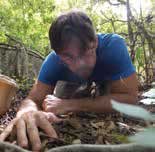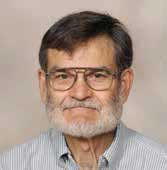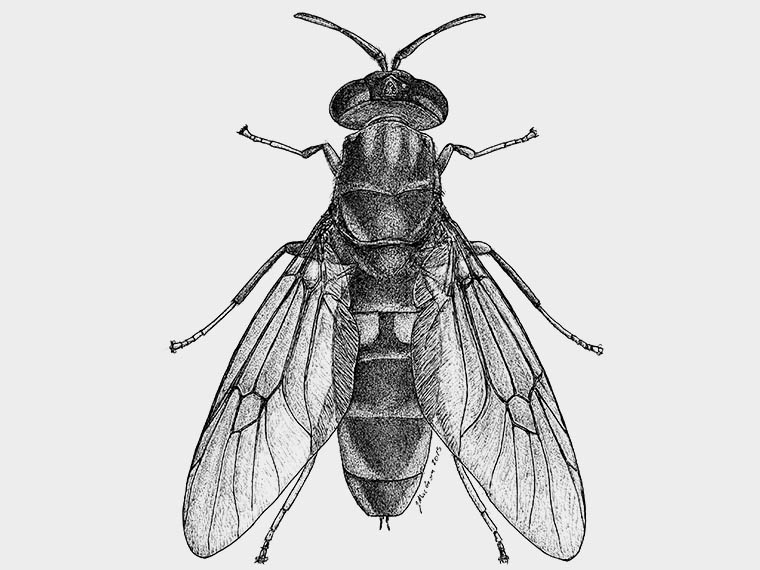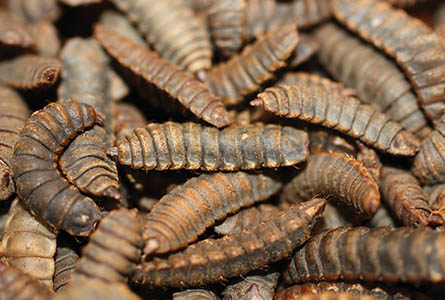The information presented on this page may be dated. It may refer to situations which have changed or people who are no longer affiliated with the university. It is archived as part of Mississippi State University's history.
As the world's population accelerates toward nine billion, scientists search for ways to improve efficiencies in food production systems. One possible solution centers on the black soldier fly, which turns agricultural waste into viable protein that can be used in feed for livestock such as chickens.
The insect looks more like a wasp than a housefly, yet doesn't possess the negative traits commonly associated with either of those insects. Unlike the wasp, the black soldier fly does not sting. Since it doesn't feed as an adult, the black soldier fly carries no disease, and it's not attracted to domestic environments, unlike the common housefly.
In order for the black soldier fly to be integrated as feed for a food production system, large numbers of the insects must be produced and raised. Rearing the insect in captivity is a challenge. This is where MSU researchers in the Mississippi Agricultural and Forestry Experiment Station play a role.
MSU is an international authority on insect rearing. The university has hosted an international insect rearing workshop for the past 15 years. Frank Davis, professor emeritus of entomology in the Department of Biochemistry, Molecular Biology, Entomology and Plant Pathology, heads up the workshop each year. He created the workshop in 2000 and has been the workshop coordinator ever since.
"International experts from all over the world convene at MSU for a week to provide in-depth instruction into the world of insect-rearing," Davis said. "Lecturers from MSU, Cornell, the University of Florida, the BASF Chemical Company and the USDA-ARS at the University of Nebraska cover everything from genetics to pathology to production systems and more."
Insect rearing is an arduous, complicated process with far-reaching and significant implications and every year attendees including scientists, pest-control professionals, zoo and museum personnel and commercial breeders learn about best practices and procedures. Over the years, more than 400 people from nearly 30 countries have attended the workshop to gain hands-on experience and insight.
In 2010, an attendee named Alfredo Llecha, from Santiago de Compostela, Spain, came to the workshop. He had been rearing black soldier flies in captivity in Spain. Llecha returned to MSU as a visiting scholar and has worked alongside John Schneider, professor of entomology in the MSU Department of Biochemistry, Molecular Biology, Entomology and Plant Pathology. Llecha and Schneider study the biology of the black soldier fly to improve rearing practices. They also research ways to incorporate black soldier fly prepupae into a large-scale food production system.
According to Schneider, studies indicate that the insect is a high-quality food source with no side effects.
"Black soldier fly larvae can reduce agricultural waste and transform the organic material into a fertile soil amendment. The larvae then become prepupae, which are 40 percent protein on a dry weight basis making them ideal for livestock feed," Schneider said. "Additionally, some of the insect's lipids might be diverted to other industrial uses such as biofuel production."
Schneider hopes the research might help pave the way for the development of industrial scale black soldier fly production by using agricultural waste streams as feedstock for the process, eliminating waste and producing a value-added product at the same time.
While the research is in the early stages, MSU is working with White Oak Pastures Farm in Bluffton, Georgia, which specializes in producing meat through sustainable production practices. The larvae consume waste and the prepupae are used to feed chickens on the farm.
"As the world's population increases, along with increased demands for healthier diets and a changing climate, it will be harder to the feed the world," Schneider said. "Our hope is that this research will help close the ecological loop, providing an efficient way to reduce agricultural waste and produce livestock feed."
Behind the Science

Joe MacGown
Research Technician/Science Illustrator
Education: Memphis College of Art
Years At MSU: Illustration
Focus: 27
Passion At Work: I get to catch insects, study them, draw them, write about them, photograph them and basically learn something new every day!

Frank M. Davis
Training Coordinator
Education: B.S.; M.S.; Ph.D.; Entomology, Mississippi State University
Years At MSU: 49
Focus: Development of corn variety plant resistance to the southwestern corn borer and fall armyworm for USDA Agricultural Research Service in Starkville, MS. I worked for ARS for 35 years
Passion At Work: I enjoy promoting high quality rearing of insects through our International Insect Rearing Workshop

John Schneider
Professor
Education: B.S., Purdue University; Ph.D.; Entomology, Biology, Princeton University
Years At MSU: 36
Focus: Physiological ecology of insects
Passion At Work: I enjoy the idea of contribution to sustainable food production.


